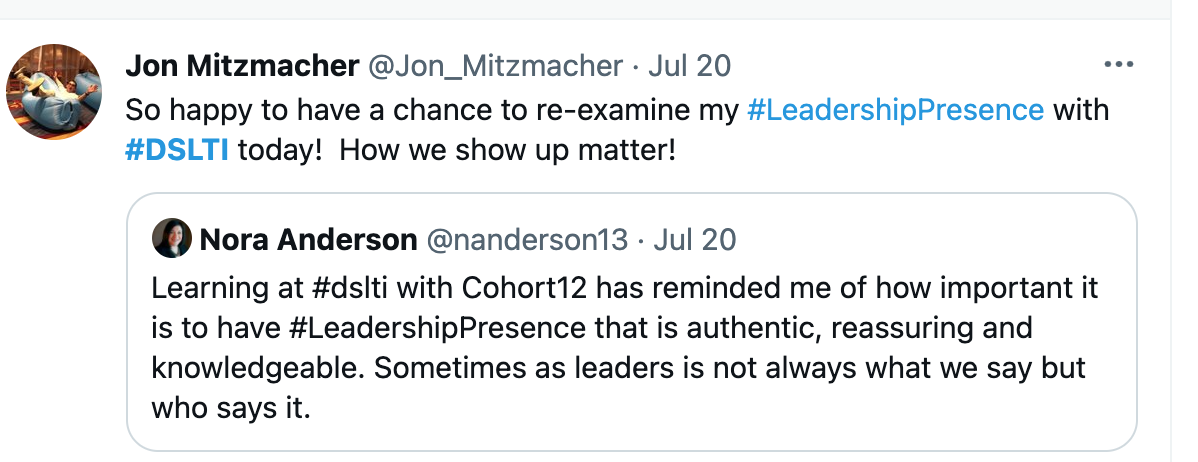Happy Summer!
I slept in until about 8:00 AM this morning and it felt so luxurious that I almost felt guilty about being such a lazybones. Such is the life I have chosen for myself…
I am extremely blessed that both my employer and my family have signed off on two pretty significant pursuits that have been occupying what bandwidth I have available once I have put all my energy towards my primary occupation. The first, beginning my rabbinical school studies, is something that I wrote about a few months ago. The second, however, is not something that I have shared out yet. I am extremely proud to have joined the faculty of the Day School Leadership Training Institute (DSLTI). DSLTI is the preeminent preparer for new heads of Jewish day schools and I was lucky enough to be a participant in its fourth cohort when I was just beginning my career. DSLTI is oriented around intense summer work, with twice-yearly retreats and weekly mentoring to flesh out the full experience. The first summer of this, the twelfth, cohort just completed its two weeks last Friday and, thus, is the inspiration for this blog post.
For my school, I believe they understand and appreciate how the learning I get from rabbinical school and from DSLTI will directly add value to my work as head of a Jewish day school. Coming straight out of the first peak experience of DSLTI, I wanted to take an opportunity to make that added value more explicit.
There are (at least) four direct ways that my preparations and work as a DSLTI Mentor will make me a better head of school:
- Books, books, books, articles, videos, and books! In order to teach the formal curriculum – which this summer focused on “Mission-Vision-Philosophy”, “School Culture”, “School Teams”, “Leadership Presence” and “Strategic Change Leadership” (of which I had a shared responsibility for teaching the latter two) – one has to be current and so I will always be reading and watching and listening to the newest research and ideas (and be refreshed in the “classics”).
- So much of how we work with our mentees – the pedagogy we employ in the program – has direct applicability to our work in schools. I have already fleshed out the first few meetings of our own Educational Leadership Team (ELT) based on the work we did on “Teams” at DSLTI. I have already programmed a chunk of our Faculty Pre-Planning Week using ice-breakers and texts we used at DSLTI.
- A lot of what we work on with our mentees comes directly from real-world situations and scenarios. The more consultancies I have an opportunity to lead or participate in, the more practical and constructive advice I receive about how to navigate experiences that absolutely can and do happen at our school. It is like having real-time access to expertly crowdsourced expertise.
- The most important – for me – opportunity that being a mentor in DSLTI provides is that it forces me to listen, to deeply listen.
Man was endowed with two ears and one tongue, that he may listen more than speak. – Hasdai, Ben HaMelekh veHaNazir, ca. 1230, chapter 26
The work of a mentor is to listen and to ask questions – both clarifying and probing – to help bring a mentee towards a measure of understanding. It is not to provide the mentee with answers to questions (although that is occasionally appropriate/necessary). It is also the HARDEST thing on earth for me to do! The coaching that I am going to receive so that I can be a good mentor is probably the thing that will add the most value to my work as a head of school. I am going to be forced to slow down, to listen deeply and most importantly to shift out of the headspace of “problem-solver” and into the space of “capacity-builder”.
When our school embraced the “7 Habits” a few years ago, I spoke a little bit about this idea when describing how I thought about “Seek First to Understand, Then to Be Understood”. The difference, I believe, is that in a “7 Habits” context we are focusing on conflict-resolution and community-building. In the DSLTI/mentor context, we are focusing on capacity-building and leadership development. The better skilled I can get as mentor will hopefully provide my Admin Team, our ELT, and all our teachers with opportunities for them to grow as educators and as leaders – which is an outcome that can only mean good things for our students and our school.

OJCS Families! Stay tuned for a brief staffing update as we have largely resolved all outstanding issues! We look forward to introducing you to the rest of the amazing 2021-2022 OJCS Faculty in the weeks ahead!


Thanks for the update Jon. You never cease to amaze me. What I’d also like to hear about is how your Rabbinical training journey is going? Look forward to hearing back.